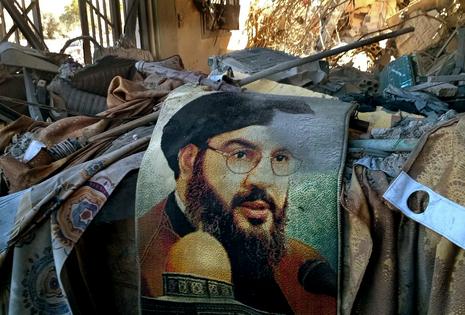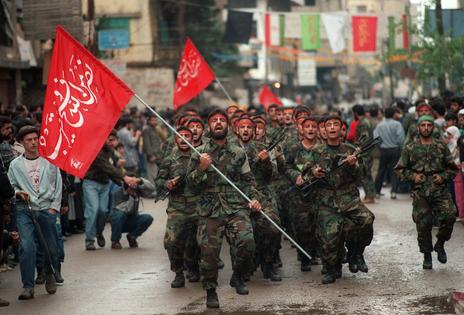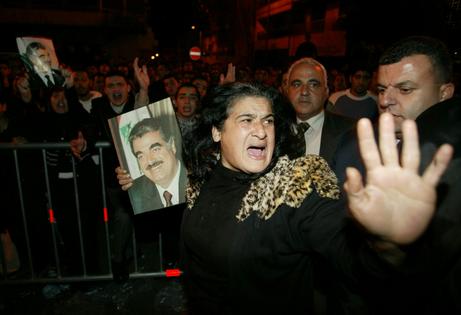Does Hezbollah represent Lebanon? And what impact will the death of longtime leader Hassan Nasrallah have?
Published in Political News
Israel has killed the leader of the militant group Hezbollah in a airstrike in Beirut, marking a further escalation of hostilities in the region.
The death of Hassan Nasrallah, confirmed by Hezbollah on Sept 28, 2024, forms part of a major Israeli push against the Iran-backed group in recent days that has resulted in the death of several top leaders – but also killed hundreds of civilians and left many more fleeing Lebanon’s south in fear of a ground invasion.
But what is Hezbollah? What exactly is its role in Lebanon? And how big a blow is Nasrallah’s death? The Conversation turned to Mireille Rebeiz, a Lebanon expert at Dickinson College who is writing her second book on Hezbollah, to help explain.
Hezbollah, which means “party of God” in Arabic, was born during the Lebanese Civil War after Israel’s invasion and occupation of Lebanon in 1982.
Officially, the group came into existence in 1985 with the publication of a manifesto that detailed Hezbollah’s aims for the region. The manifesto outlined a plan to duplicate the Iranian revolution of 1979 in Lebanon and create a Shiite Islamic state. It pledged allegiance to the Supreme Leader of the Iranian Revolution, Ruhollah Musavi Khomeini, and vowed to fight the Israeli occupation of Lebanon and the Palestinian territories.
The Lebanese Civil War ended in 1991 with the signing of the “Taif Agreement,” in which warring factions agreed that a political and democratic process was the only way to move forward in Lebanon. Consequently, Hezbollah had to develop a political wing, and in 1992 Hezbollah entered the political ring, running for national elections and winning 12 out of 128 parliamentarian seats.
But while the peace agreement called for the disarmament of militia groups, Hezbollah was allowed to retain its armed wing as a “resistance” group, fighting Israeli occupation in south Lebanon.
Many Lebanese political parties allied themselves with Hezbollah at this juncture. While these parties did not necessarily share the group’s views or its commitment to Iran, they were similarly committed to fight the Israeli occupation, and Hezbollah fighters were the main force doing so.
Hezbollah’s presence in parliament and the Lebanese government, and its alliance with various political parties, allowed it to control the country and veto decisions that do not fit its agenda or promote its interest.
This is particularly apparent in the country’s recurrent presidential vacuum.
Since 2005, Lebanon has had three presidential lapses: from Nov. 2007 to May 2008, from May 2014 to October 2016, and from Oct. 31, 2023 until today. The parliamentarian Speaker, Nabih Berri, who is Shiite and known for his allegiance to Hezbollah, refuses to convene the parliament for presidential elections unless the nominee is approved by Hezbollah and its allies.
As well as having a political and military wing, Hezbollah also provides various services, such as social welfare, health care, utilities, education and even security to his community.
Yes — Hezbollah is primarily an Iranian-backed militia. It exists to serve the Iranian regime and expand its ideology in the region, as set out in the group’s 1985 manifesto. In 2009, Hezbollah issued a new manifesto in which it reaffirmed its commitment to the Shiite Islamic resistance led by Tehran.
As to its financial and military support, in 2016, Nasrallah confirmed: “Hezbollah’s budget, everything it eats and drinks, its weapons and rockets, comes from the Islamic Republic of Iran.”
Furthermore, with the backing of Iran, Hezbollah was able to create and expand its own illegal financial network through money laundering, drug trafficking and other unlawful activities.
Along with Iran, Syria has played a major role in Hezbollah’s development. The Taif Agreement called for Syrian Armed Forces to enter Lebanon for a two-year period to help establish law and order after more than a decade of civil war.
But it stayed in Lebanon for over 16 years, and the Syrian government’s closeness to the Iranian regime made Hezbollah a perfect ally. So much so, that when civil war broke out in Syria in 2011, Hezbollah emerged as a major actor in that conflict, sending thousands of Lebanese fighters to Syria to assist the government’s efforts to suppress a popular uprising.
Support for Hezbollah has fluctuated over the years. When Israel withdrew from Lebanon in 2000, many Lebanese celebrated Hezbollah as the country’s liberator.
But others started pushing for Hezbollah to cease its military operations and for the Lebanese Armed Forces to take over Hezbollah’s task in securing Lebanon’s borders.
In addition, growing anti-Syrian sentiment in Lebanon, in part due to serious human rights violations, also dented Hezbollah’s popularity because of their close ties.
On Feb 14, 2005, Lebanese Prime Minister Rafic Hairi, who was known for his opposition to Hezbollah and Syria, was assassinated. Evidence suggested that both were involved.
The killing sparked massive anti-government, anti-Syrian and anti-Hezbollah protests on the streets of Beirut. The subsequent Cedar Revolution led to the departure of the Syrian forces from Lebanon and marked a drop in Hezbollah’s popularity, in general.
This drop was apparent in the 2005 elections, in which an anti-Syrian and anti-Hezbollah political coalition claimed victory.
Since 2005, Lebanon has seen a series of events that indicate a clear opposition to Hezbollah. Several journalists and political figures were assassinated for speaking out against Hezbollah and Syria. Their deaths outraged many Lebanese.
And in 2015, the “You Stink” environmental movement was born to protest political corruption and Hezbollah’s control of waste management.
In 2019, a similar protest movement was born in which Lebanese took to the streets to express their frustration against corruption and inflation. Under the slogan “All Means All,” Lebanese protested all political parties — including Hezbollah.
These events indicate Lebanese dissatisfaction with Hezbollah.
A 2020 poll showed a drop in Hezbollah’s popularity even among the Shiite community, which makes up about a third of the population.
Polling during the almost year of hostilities following the Oct. 7, 2023, attack by Hezbollah ally Hamas on Israel suggests that Hezbollah’s influence continues to exceed its popularity. An Arab Barometer poll of Lebanese in early 2024 found that only 30% trust Hezbollah, whereas 55% said they do not trust the group at all. While Hezbollah still retains the trust of 85% of Shiites, only 9% of Sunnis and Druze and 6% of Christians trust the militia.
Originally, Hezbollah leadership consisted of a religious council of seven members created in the 1980s; it has branches and committees that govern different affairs including finances, social, political and military issues. This religious council, or “Shura Council,” has regional offices in Beirut, the Bekaa Valley in the country’s eastern region and south Lebanon.
At the end of the Lebanese Civil War, two more bodies were added: an executive council and a politburo, or central political body. The religious council was chaired by Sayyid Muhammad Hussein Fadlallah, who offered religious guidance to the Shiite community and was often described as Hezbollah’s spiritual leader.
Both the council and Hezbollah swear allegiance to Iran’s Supreme Leader. The council is also tasked to select Hezbollah’s Secretary General.
After the Israeli assassination of Hezbollah’s co-founder, Abbas al-Musawi, in 1992, Hassan Nasrallah assumed this role and remained Secretary General until his death in Beirut in the current Israeli campaign.
The attacks on Hezbollah’s pagers and other wireless devices were primarily intended to creat chaos and cut communication between different leaders and units.
The assassinations of Hezbollah commanders are meant to remove major decision-makers. The death of Secretary General Nasrallah is a definite blow to the group, which is already vulnerable from last week’s attacks. The goal is to demoralize its fighters.
Furthermore, these attacks convey a clear message that Israel will no longer accept the tit-for-tat attacks on its northern border.
However, Israel may not necessarily get its desired impact.
After Israel assassinated Abbas al-Musawi, his wife and son, his death only reaffirmed Hezbollah’s commitment to its mission. Nasrallah followed Al-Musawi’s footsteps, and under his leadership, the group grew its recruitment, arsenal and reach inside and outside Lebanon.
The situation now is fluid and it’s hard to predict what will happen next. But the fresh wave of violence may only reinforce Hezbollah’s resolve.
Furthermore, it might see more involvement of other Hezbollah-aligned players into the region, such as the Houthis in Yemen and Kata'ib Hizballah in Iraq.
Following the announcement of Nasrallah’s death, Iran’s Supreme Leader Khamenei threatened Israel and vowed more support to Hezbollah in Lebanon.
This article is republished from The Conversation, a nonprofit, independent news organization bringing you facts and trustworthy analysis to help you make sense of our complex world. It was written by: Mireille Rebeiz, Dickinson College
Read more:
Lebanese civilians are fleeing the south, fearing an Israeli invasion − a look back at 1982 suggests they have every reason to worry
A weakened Hezbollah is being goaded into all-out conflict with Israel – the consequences would be devastating for all
Chess: a game rooted in military strategy that has become a tool of international diplomacy
Mireille Rebeiz is affiliated with the American Red Cross.


































































Comments